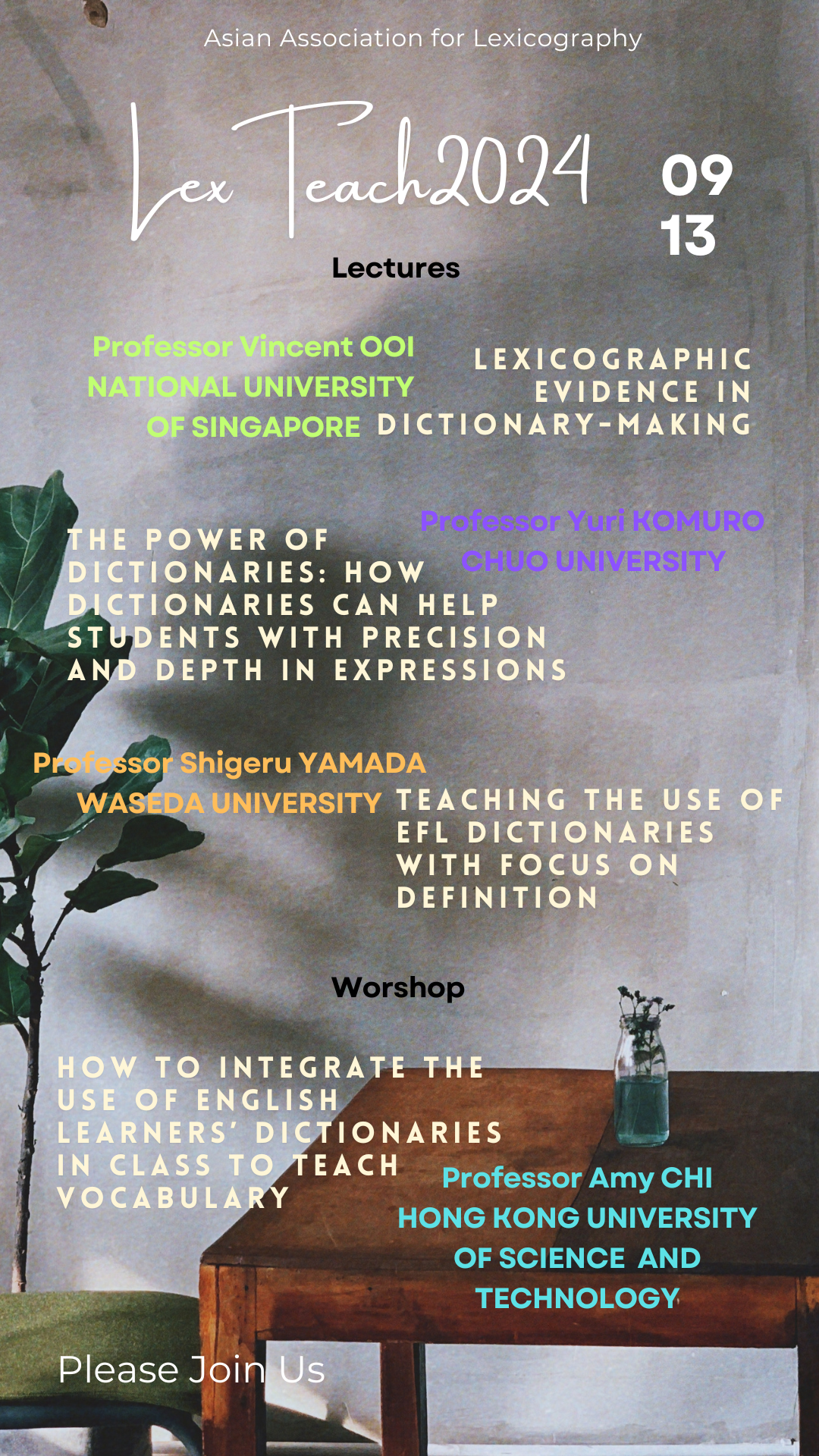
Workshops

Workshops


PAGE TOP
SCROLL




LexTeach is a project offered by the Asian Association for Lexicography to promote lexicography to the public. The project seeks to disseminate dictionary knowledge essential for users to understand how dictionaries could meet their needs. Such needs include learning and/or teaching English as a foreign language.
Anyone who is interested in knowing more about dictionaries or lexicography. LexTeach lectures and workshops focus mainly on EFL dictionaries like: Cambridge Advanced Learner’s Dictionary; Collins COBUILD English Language Dictionary; Longman Dictionary of Contemporary English; Merriam-Webster Learner’s Dictionary; and Oxford Advanced Learner’s Dictionary.
LexTeach lectures and workshops would be particularly of relevance to 1) EFL students (Upper intermediate to Advanced) and 2) English teachers who want to teach students how to use dictionaries to learn English.
◆ 10:30-12:30 Amy M L Chi “How to integrate the use of English Learners’ Dictionaries in class to teach vocabulary”
◆ 12:30-14:00 Lunch Break
◆ 14:00-14:45 Vincent Ooi “Lexicographic evidence in dictionary-making”
ID: 925 4528 2127 Passcode: 034921
◆ 14:50-15:35 Yuri Komuro “The power of dictionaries: How dictionaries can help you with precision and depth in expression”
ID: 924 3259 5606 Passcode: 696821
◆ 15:40-16:25 Shigeru Yamada “Teaching the use of EFL dictionaries with focus on definition”
ID: 963 5145 1497 Passcode: 523251
◆ 16:30-17:00 Discussion
ID: 933 4561 3474 Passcode: 466483
How to apply: Fill out the registration forms via the links provided below. All details of the LexTeach 2024 will be given in the registration forms. Application is FREE and is offered on a first-come, first-served basis. LexTeach is supported by ASIALEX 2024 for free. Participants DO NOT need to register for ASIALEX Conference 2024 to join.
Registration Links:
Lecture #1 Professor Vincent OOI
Lecture #2 Professor Yuri KOMURO
Lecture #3 Professor Shigeru YAMADA
Find the details here: Invitation to LexTeach_public

Part 1 (Japanese session)
Chair: Shigeru Yamada (Waseda University)
ID: 942 6949 0821 Passcode: 540223
◆ 9:00-9:40 Kaoru Akasu (Toyo University; Editor of Lighthouse English-Japanese Dictionary, 7th ed., 2023, Kenkyusha)
「英和辞典を使う際に求められるもの」(What you need to know when using English-Japanese dictionaries)
今回の発表は日本語で行う。その理由は、いわゆる「学習英和辞典」に特化した話になるからである。「英和辞典」というのは日本人の英語学習者のためのものということが大前提となっているが、このことはあまりにも当たり前すぎて前面に出てくることは少ない。使用者である日本人学習者並びにその人たちを支える立場に立つ日本人の先生方に聞いて頂きたい内容であるため、日本語の発表にしたいと考えた。ハードルを下げ、より多くの日本人を対象に、より広く情報を共有したいと思う。
話の中身の方であるが、昨今の学習者は辞書を十分に活用できていないという実態があると思われ、その理由の一端を考えたい。これも当たり前すぎてあまり指摘されてこなかった点であると思うが、辞書は文法に基づいて書かれている。従って、辞書を使いこなすためにはこの文法を身に付けておくことが必要となる。発表者個人の(狭い)経験の中で感じることであるが、最近の学習者はこの文法が十分に身に付いていないのではないか、理解が不十分ではないかという印象を強く持つ。それゆえに辞書を十分に活用できていないのではないかという主張を、授業内での実例を引き合いに出しながら、行おうと思う。文法の理解が進めばすべてが解決されるというほど単純な話ではないが、それがひとつの要因であり、改善の必要があることを指摘したい。
◆ 9:45-10:25 Nagayuki Inoue (Hiroshima University; Editor of Wisdom English-Japanese Dictionary, 4th ed., 2019, Sanseido)
「学習辞典で基本語を引く」(Looking Up Common Words in Learners’ Dictionaries)
上級者向け学習英和辞典においては,主見出し項目を独自の基準に
◆ 10:25-10:35 Break
Part 2 (English session)
Chair: Shigeru Yamada (Waseda University)
◆ 10:35-11:15 Hirosada Iwasaki (Tsukuba University; Editor of Favorite English-Japanese Dictionary, 4th ed., 2021, Tokyo Shoseki)
“Countermeasures to the problems among learners who do not use dictionaries: Dictionary search instruction and AI utilization”
Are dictionaries becoming obsolete and endangered objects, like typewriters and VHS tapes? Fewer and fewer Japanese learners of English seem to be using dictionaries when necessary, which results in their failure to construct a vocabulary network that includes pronunciation, conjugation, derivation, collocation, and word formation with affixes. This makes it very challenging for Japanese EFL learners to use English productively, as required by the Course of Study set by Japan’s Ministry of Education, Culture, Sports, Science and Technology.
Another current lexical problem, in contrast, highlights the difficulty learners face in understanding dictionary entries when they need to paraphrase low-frequency words or idiomatic, opaque expressions. This issue arises when learners attempt to make a summary speech in a CLIL (Content and Language Integrated Learning) style, using authentic materials for an EFL audience, but fail to appropriately utilize bilingual explanations or monolingual dictionary definitions as paraphrasing samples.
Therefore, this study argues, with specific examples, that the use of dictionaries, whether paper or digital, is still necessary for constructing a vocabulary network as mentioned above. However, it also asserts that generative AI is more powerful and easier to use for EFL learners when it comes to paraphrasing. This is demonstrated through AI’s use for paraphrasing and proofreading, particularly when set to CEFR levels.
◆ 11:20-12:00 Yukio Tono (Tokyo University of Foreign Studies; Editor of Ace Crown English-Japanese Dictionary, 3rd ed., 2019, Sanseido)
“The relationship between dictionary reference skills and English proficiency levels from CEFR perspectives”
The Common European Framework of Reference (CEFR) is gaining popularity as a tool for describing current practices and redesigning language curricula, syllabi, teaching materials, and assessment tools. The CEFR considers learners as language users and social agents who become independent users of the target language at the B1 level. Encouraging learners to be autonomous language users is crucial, and acquiring reference skills is essential for this autonomy. However, the current CEFR doesn’t adequately specify dictionary reference skills—a gap that requires further research. User perspectives in L2 lexicography can offer valuable insights for improving the CEFR in this area. In this talk, I’ll examine how the CEFR illustrative descriptors treat dictionary skills and discuss their integration into the CEFR, considering what learners can do with language at different CEFR-defined proficiency levels.
Application is FREE and is offered on a first-come, first-served basis. To participate in the workshop, pleaes fill in the Google form here.